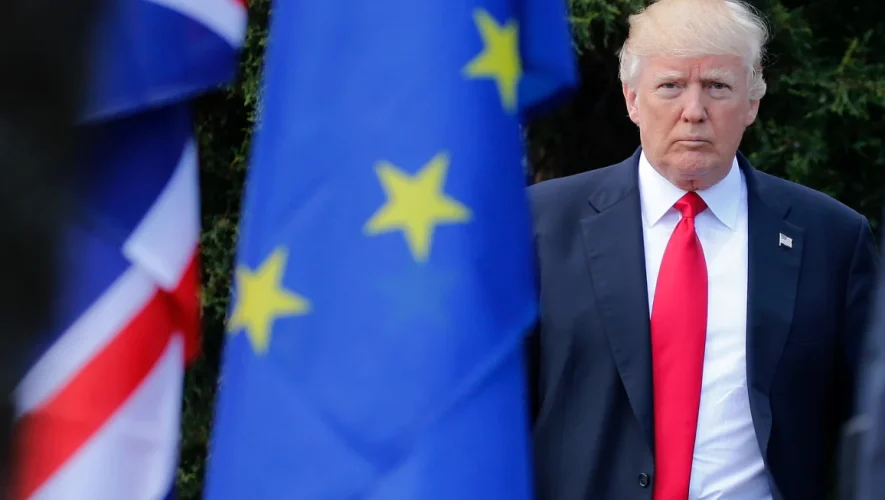Donald Trump is a controversial president—from both a national and global perspective. His stark rhetoric sparked a frenzy of international debates, leaving many to question the future of democracy. Researchers across disciplines have noted a significant shift in EU-US relations, despite the relatively stable alliance that existed following WWII. Both Europe and the US are global powerhouses, and their collaboration impacts countries worldwide. Yet, the current era is filled with geopolitical tensions. Trump’s presidency has destroyed the once powerful alliances and the relations are in dire need of repair.
Trump introduced a new culture to not just American politics, but also to American daily life. He encouraged American citizens to embrace nationalism, sparked debates on identity, and transformed the way Americans engage in civic and political discourse. Europe has maintained the status quo, as politics are not at the forefront of national identity. Typically, cultural differences exist and are healthy. In the case of the Euro-American relationship, the cultural differences enacted by Trump continue to affect global politics negatively. The choice on whether to sever ties or to fix the strained relationship lies in the hands of American politicians and citizens.
Dissecting the Strain
The root of the decaying transnational relationship stems from the Trump presidency. There are several factors that contributed to this now fragile relationship, including climate change, the response to COVID-19, security threats, the media, and Trump’s desire to be the “world’s policeman.” Due to its economic and military power, Trump was able to bluntly impose American interests over other countries, often speaking over the voices of other nations.
During the Trump administration, there was a clash between European and American lawmakers over the severity of climate change. Europe has a deeply rooted commitment to strong environmental agendas, and this is not shared by Trump. For example, Trump withdrew from climate agreements, such as the Paris Agreement. This showed a pro-climate Europe that the United States did not prioritize or take accountability for climate action, adding strain to European politicians who are elected by climate-conscious voters. Politicians have difficulty justifying their alliances with the United States when statements are made refuting the legitimacy of climate change. If the United States does not adopt policies to prevent or mitigate the effects of climate change, the alliance with Europe can be considered lost. Though President Biden reentered the Paris Agreement, the United States is still behind in meeting climate goals.
Another issue affecting voter opinion in recent years is Covid-19 policy. European countries had very strict Covid-19 policies that included travel restrictions, mandatory testing, mask mandates and extensive quarantines mandated by the European Union. Trump took a conservative stance regarding the pandemic, which included reprimanding mask and vaccine mandates. Trump’s conservative and unresponsive attitude towards the pandemic created a further drop in his perception by Europeans, which was at an all-time low in March of 2020. Europeans felt a disconnect as his response may have been viewed as irresponsible and disrespectful to those that suffered during the pandemic. Though it’s been four years since the start of the pandemic, the negative views carry over and become a subconscious thought in the minds of Europeans.
Beyond climate change and Covid-19, Europeans felt that Trump was a threat to their security. This factor is more keenly felt by policymakers rather than everyday citizens. Europeans felt that Trump made the NATO alliance much more transactional, as he pressured European nations to meet his high defense expenditure targets. NATO has been a collaborative entity founded by a treaty to “guarantee freedom” to its member countries. Trump’s remarks on how he believed European countries were not contributing fairly to collective defense rubbed European politicians the wrong way.
By demanding European members to contribute more to defense budgets, he is effectively forcing European militarization. However, militarization is a sensitive subject to Europeans, who have a losing history when it comes to warfare. As WWI and WWII were both fought on European soil, Europeans are much more conscious when it comes to war. Trump put power in his hands by “engaging in military conflicts [to momentarily simulate] sovereignty.” By enforcing monetary targets that only the United States could meet Trump put himself as the lead authoritative figure of NATO, and therefore global security.
As President, Biden has had the job of repairing the relationship that Trump damaged. Biden has taken a pro-Ukranian stance and has attempted to be amicable and flexible regarding defense budgets. In Europe, Biden polls better than Trump, though his favorability is still low. This may be due to his lackluster policies or that negative carry-over from Trump that has permanently tainted the United States’ reputation. Trump’s election shocked Europeans, who didn’t expect that millions of Americans would elect such a controversial figure. This shock will take years to recover from—if at all—given Trump is currently active in American politics as the 2024 Republican nominee for President.
Given the prevalence of media in the modern world, it should not be surprising that it has greatly contributed to the strained Euro-American relationship and is the leading cause for the aftershocks of the Trump Presidency. Trump was one of the first presidents to freely use the digital world as a method of information sharing. This characteristic brought together his domestic supporters while giving Europeans a direct view of the American government. Those abroad could witness the conservative ideologies and controversial statements shared by Trump, which caused them to be fearful of his leadership, as he shared incredibly conservative and often factually incorrect statements.
Though both Americans and Europeans consume social media at high rates, there is a difference in its usage. In the United States, social media often serves as a platform for consumer marketing, promoting products and individuals. Trump utilizes strong and seemingly controversial slogans to promote his ideology. Trump was able to use social media (now his own platform “Truth Social”) to create emotional ties with his base. Social media stereotypes about Americans have developed through Trump’s usage of offensive terminology, such as “Mexicans” instead of “Latinx.” Conversely, in Europe, there are stricter laws preventing “illegal or harmful content online.” This prevents politicians from spreading fake news which helps eliminate parasocial relationships that may be formed.
Western countries are growing in nationalist ideology, and this is not simply an American phenomenon. It can be seen by the rise of right-wing parties in European countries, such as the National Party in France, AFD in Germany, or Swedish Democrats in Sweden. Trump’s presidency normalized anti-democracy, nationalism, and the merge of religion and politics. These characteristics are true to right-wing movements globally and Trump is simply the predecessor for other conservative politicians. He proved to politicians that the far right can win elections by motivating voters concerned with economic strife.A win for Trump in 2024 would be a gateway for other European nations to elect anti-democratic leaders.
Studies of European countries suggest that Trump’s mentality of being the “world’s policeman” has made even right-wing Europeans feel animosity towards the American president. As a world policeman, Trump desires the sovereignty to intervene in matters in countries other than his own. This goes against each European country’s nationalism. Trump sets himself up on a pedestal, where he values himself the most important player, refusing to acknowledge that Europe holds power.
To preserve its power globally, the United States should be desperate for positive global attention. The disconnect in American politics is seen from afar, reinforcing the need for a united front. Though Europeans hold the misconception that the US is predominantly conservative, the country actually has a significant population of moderates and liberals. Americans are more emotionally polarized than ideologically, yet politicians stay electable by asserting the opposite. Modern politicians like Trump purposefully push their followers to vehemently hate “the other side.”
Another way the United States has the ability to mend its relationship with Europe is by electing non-polarizing political figures. For example, Vice President Kamala Harris, who is currently running for President, may offer a way out of Trump’s America if elected. Harris represents an opportunity for a reset, as she presents herself as liberal, non-divisive, and logical compared to Trump. She could reshape the European view towards Americans if she governs well. It is very plausible that if Trump wins the 2024 election, ties between Europe and the United States would become irreparable. Trump’s past presidency is still affecting politics today. A reelection could undo all the cultural and political repairs that the Biden administration enacted in the past four years.
The European-American disconnect could have drastic consequences for global alliances. It would not be in the United States’ best interest for Europe to turn to China—an emerging world power that is threatening the US for its role as global policeman. If Europe allies itself with China, the US will no longer have the strongest economy and military force. Estrangement between nations could drastically reduce American and European worldliness and opportunity. Both parties would be cut off from each other culturally and travel would become less feasible if there is a strong sense of dislike from either entity. Nationalism would grow in each country and a cycle of single-mindedness may become unbreakable.
Policy is a crucial element to reestablish a strong working professional relationship, and can eventually lead to a renewed understanding between the people as well. Current American policymakers can evaluate the reasoning behind the strained relationship to tailor diplomatic strategies that align more closely with European values and sentiments. This would foster a more collaborative and mutually beneficial relationship. Such strategies include having a proactive approach towards climate change, scientific discovery, and transnational relations.
Oversimplified assumptions about how Europeans view Americans is a form of American ignorance. The factors that have caused these negative perceptions need to be addressed urgently. An informed understanding of European attitudes towards Americans can create stronger diplomatic ties and enhance global cooperation to avoid dire consequences. In a world where geopolitical tensions heighten, we must take the time to understand international perceptions and use our political power to elect officials that promote political collaboration.



